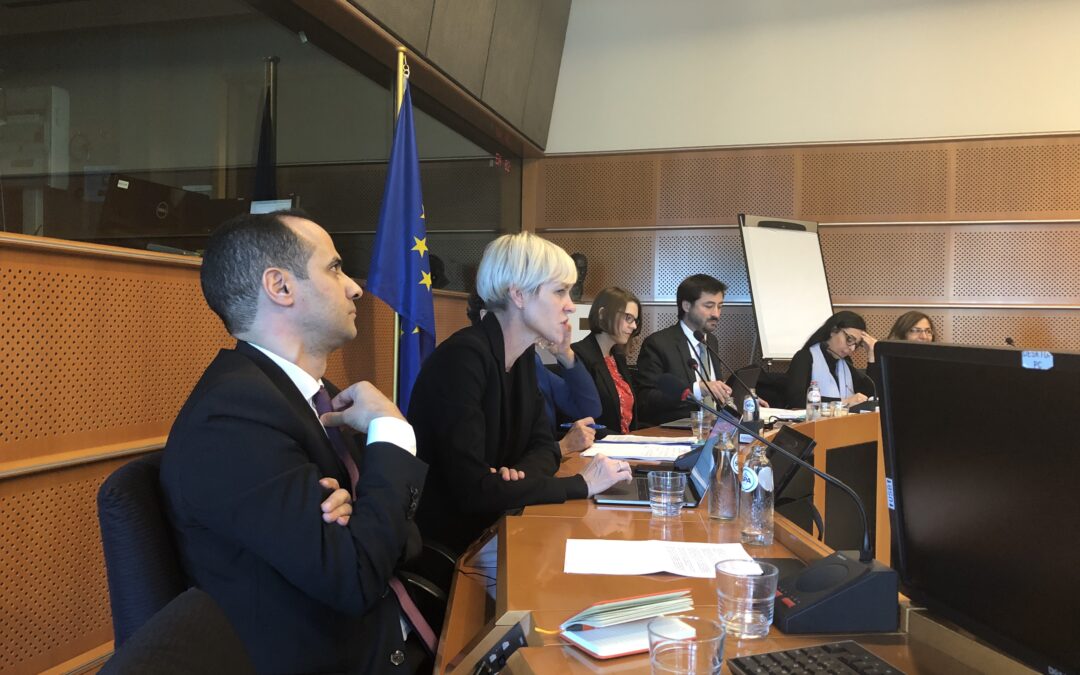
Nov 22, 2019 | News
On 20 November 2019, the ICJ and Tineke Strik, Member of the European Parliament, hosted a roundtable discussion in Brussels on the ICJ’s report Accountability for Crimes under International Law in Libya: An Assessment of the Criminal Justice System.
Panelists called for the establishment of a Human Rights Council mandated Commission of Inquiry on Libya and for States to refrain from entering or implementing agreements that could give rise to support for or complicity in violations of international law.
They also called for the intensification of monitoring of Libyan Coast Guard operations and publication of its key findings, and for the European Commission to ensure its cooperation with Libyan authorities is conditional on meeting concrete, verifiable and timebound benchmarks.
At the launch, Said Benarbia and Kate Vigneswaran, MENA Programme Director and Senior Legal Adviser respectively, discussed the findings and recommendations of the ICJ’s report examining the criminal justice framework in Libya. The report finds that investigations and prosecutions of crimes under international law have been limited to a handful of cases, and substantial reforms to the legal framework are required to ensure fair and effective justice in future cases.
In light of the report’s findings, Marwa Mohammed, Head of Advocacy and Outreach for Lawyers for Justice in Libya, discussed the arbitrary detention of thousands of migrants, refugees and asylum seekers in Libya, systematic human rights violations and abuses being committed against them, and absence of options for protection, repatriation and return, including as a result of EU States’ policies.
Philippe Dam, Advocacy Director for Europe and Central Asia at Human Rights Watch, then discussed the engagement of the EU, European Commission and EU States with Libyan authorities, including in the context of violations and abuses committed against migrants, refugees and asylum seekers intercepted by the Libyan Coast Guard.
The panel was introduced by Karolina Babicka, Legal Advisor for the ICJ’s Europe and Central Asia Programme, and moderated by Tinneke Strik. It was attended by representatives of the European Commission, the EEAS, UNHCR, non-government organizations and independent persons
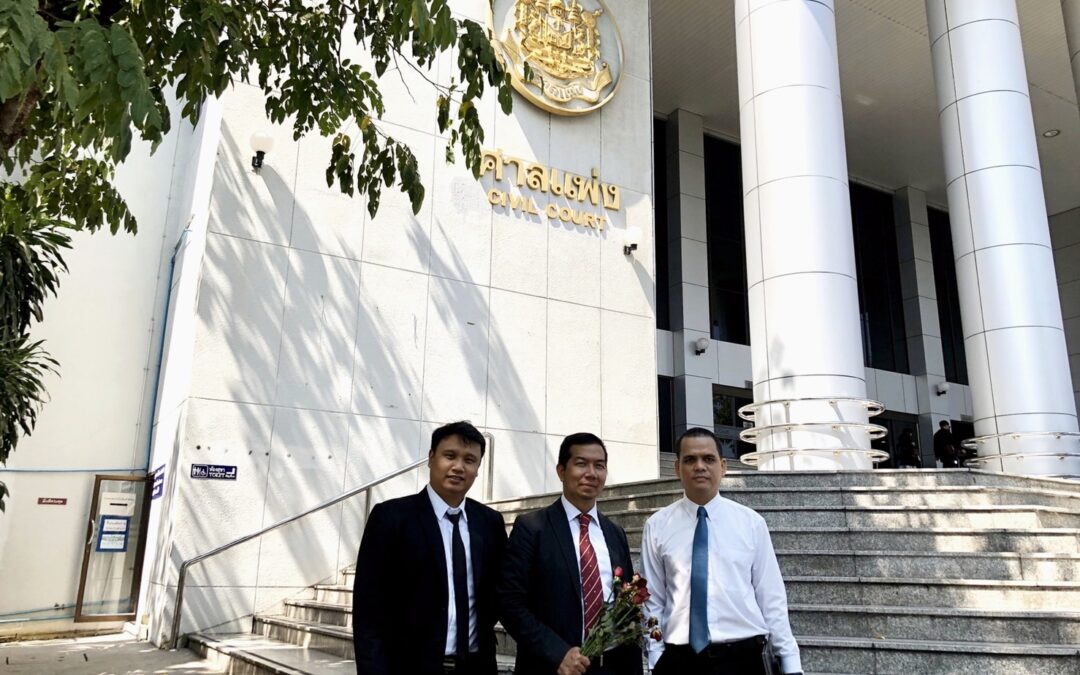
Nov 12, 2019 | News
Today, the ICJ condemned the use of civil proceedings to harass Nakorn Chompuchart and Sira Osottham, lawyers representing labour rights researcher Andy Hall.
The ICJ called on Thailand to take measures to protect lawyers so that they can perform their duties without intimidation, harassment or improper interference.
On 12 November 2019, the Bangkok Civil Court conducted its first hearing in a tort case under the Civil and Commercial Code by a Thai fruit processing company, Natural Fruit Company Ltd. (‘the Company’), against the lawyers. The two lawyers represent Andy Hall in several criminal and civil proceedings brought against him seeking damages claimed to have resulted from his research into labour rights abuses allegedly committed by the Company. In the lawsuit against the lawyers, the Company is seeking 50 million Thai baht (approximately 1.65 million USD) as compensation for lost business.
“This legal action is part of a pattern of harassment by Natural Fruit against Andy Hall,” said Frederick Rawski, ICJ Asia Pacific Regional Director. “It is a bedrock principle of the rule of law that lawyers should not be identified with their clients or their clients causes as a result of discharging their function.”
In the complaint, Natural Fruit claims that Andy Hall and his lawyers “excessively exercise their rights”, “intentionally damage the Company’s reputation”, and “caused financial loss in their business” when they brought a case in 2017 against the Company, the Company’s lawyers, and public prosecutor for allegedly “giving false testimony” and “filing false complaint” in other criminal proceedings. The case was dismissed by the Supreme Court who was of the view that the Company exercised its right in good faith.
“This is not the first time in Thailand that lawyers have faced the unwarranted threat of criminal or civil prosecution when representing their clients,” said Rawski. “As with the criminal proceedings brought against Sirikan “June” Charoensiri for her professional activities as a lawyer, such vexatious actions set a precedent that endangers the ability of lawyers to effectively represent their clients. The government must take prompt and effective measures to ensure that the safety and independence of lawyers is guaranteed in law and in practice.”
Background
This case was also initially brought against Andy Hall, but was later withdrawn because the Court could not send court writs to Andy as he does not reside in Thailand.
Criminal and civil proceedings have brought against Andy Hall were in relation to the report of a Finnish NGO, Finnwatch, published in January 2013, called Cheap Has a High Price, which alleged that labour rights violations were taking place at Natural Fruit Company.
Thailand is a party to the International Covenant on Civil and Political Rights (ICCPR). Article 14 of the ICCPR guarantees the right of the clients of the concerned lawyers to an effective defense.
UN Basic Principles on the Role of Lawyers also provides that “governments shall ensure that lawyers are able to perform all of their professional functions without intimidation, hindrance, harassment or improper interference” and “shall not suffer, or be threatened with, prosecution or administrative, economic or other sanctions for any action taken in accordance with recognized professional duties, standards and ethics.” Moreover, lawyers should not be identified with their clients or their clients causes as a result of discharging their function.
To download the statement in Thai, click here. (PDF)
Contact
Frederick Rawski, ICJ Asia-Pacific Director, t: +66 64 478 1121; e: frederick.rawski(a)icj.org
Further reading
Thailand: verdict in Andy Hall case underscores need for defamation to be decriminalized
Thailand: amicus in criminal defamation proceedings against human rights defender Andy Hall
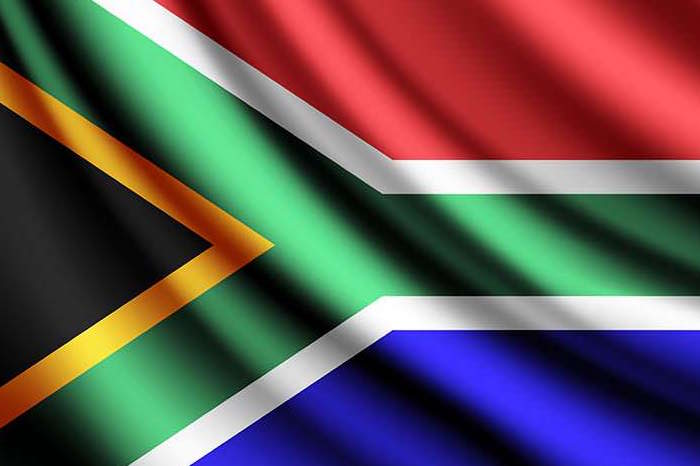
Nov 4, 2019 | News
The ICJ today expressed its grave concern at the conduct of police forces in their enforcement of a court order to remove refugees and asylum seekers from the offices of the United Nations High Commission for Refugees (UNHCR) in Cape Town on October 30.
Police appeared to be using excessive and unlawful force, resulting in injuries to some protestors.
The ICJ called for a prompt independent, impartial, and through investigation into the police conduct, with a view to holding account officials responsible for any ill-treatment and to prevent such methods of policing to recur.
While trying to remove largely peaceful protestors from the premises, police fired rubber bullets and stun grenades against refugees who were protesting in the streets of Cape Town last week. A video clip widely shared on social media showed police ripped a baby from a woman.
The court had granted an interdict to remove the group in Cape Town on October 18 at the Cape Town Magistrate’s Court following an application by the building landlord to evict the group. More than 100 protestors were arrested and released on warnings.
“The way refugees were treated in Cape Town on Wednesday is shameful. South African authorities should be acting to protect migrants from the xenophobic violence and threats they have been experiencing, not to perpetuate them,” said Arnold Tsunga, ICJ Africa regional director.
Refugees and asylum seekers had staged a sit-in outside the UNHCR offices in Cape Town and Pretoria for four weeks now, pleading to be resettled outside of South Africa, claiming that they felt unsafe. They said that recent attacks on foreign nationals left them feeling unsafe in South Africa. (Read the ICJ statement on the attacks here.)
In a statement, the UNHCR said the organization had received concerns of personal safety, access to documentation, challenges accessing services, and lack of job opportunities from the asylum seekers and refugees who had been camping outside of its offices.
The statement also indicated that some of the protesting group had demanded resettlements, which were only available for a limited number of vulnerable refugees. The UNHCR said it had been engaging with the refugees and asylum seekers since the protests began, encouraging them to participate in constructive dialogue to address their grievances and find a peaceful resolution to the situation.
“We call on South African authorities the United Nations Human Rights Council (UNHRC) to urgently address migrants’ concerns in a constructive and amicable manner before the situation escalates further,” Tsunga added.
Background
South African law and international law forbid the unnecessary and disproportionate use of force and protect people from ill-treatment. .
The UN Basic Principles on the Use of Force and Firearms by Law Enforcement Standards provides that law enforcement officials must use restraint and may use force only where only where strictly necessary, and any such force must be proportionate to the legitimate object, such as making a lawful arrest and protecting the lives and safety of others.
South Africa is party of the African Charter of Human and Peoples Rights and the International Covenant on Civil and Political Rights, both of which guaranteed from torture and cruel, inhuman or degrading treatment, including that resulting from unlawful use of force.
Contact
Arnold Tsunga (Director): c: +26 37 7728 3249 e: arnold.tsunga(a)icj.org
Shaazia Ebrahim (Media Officer): c: +27 71 670 6719 e: shaazia.ebrahim(a)icj.org
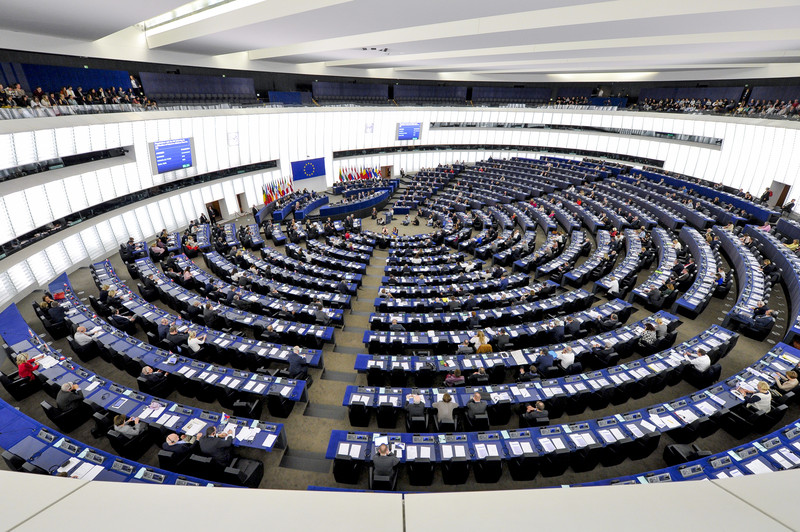
Nov 4, 2019 | Advocacy, News
On 4 November, the ICJ and 16 other organizations called on Members of the European Parliament (MEPs) to postpone consent to the EU-Vietnam Free Trade Agreement (EVFTA) and the Investment Protection Agreement (IPA) until the Vietnamese government seriously tackles the deteriorating human rights situation in the country.
The letter was addressed to the President of the European Parliament, Chair of the International Trade Committee, Chair of the Foreign Affairs Committee, Chair of the Human Rights Subcommittee, Chair of the Development Committee and all Members of the European Parliament.
Noting that the Vietnamese government had, in recent years, intensified its crackdown on human rights defenders, members of civil society, religious groups and individuals who express opinions deemed critical of the government, continued to strictly curtail the rights to free expression, opinion, association and assembly, and tightly control the press, civil society and religious groups, the organizations expressed regret that negotiations for the EVFTA and the IPA had not led to more explicit and tangible human rights commitments from the Vietnamese government.
Vietnam currently benefits of unilateral trade preferences through the Generalised Scheme of Preferences (GSP), and the country’s failure to uphold its numerous human rights obligations under the scheme has yet to incur substantial pushback by the EU.
The organizations urged MEPs to ask the European Commission to set up an independent monitoring and complaint mechanism to address the human rights impacts that the EVFTA and IPA may have.
Joint Letter
Frederick Rawski, Director, ICJ Asia and the Pacific, email: Frederick.Rawski(a)icj.org
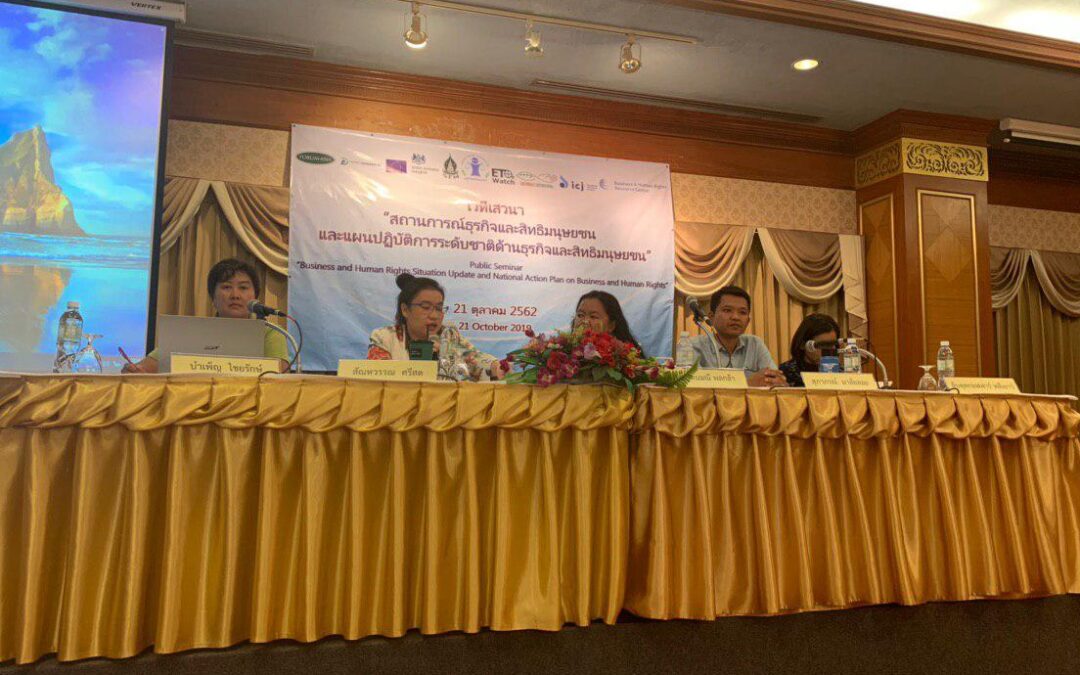
Oct 22, 2019 | Advocacy, News
On 21 October 2019, the ICJ co-hosted an event on “Business and Human Rights and Thailand’s National Action Plan on Business and Human Rights” at Mido Hotel in Bangkok.
The discussion surrounded the evolution of business and human rights in Thailand and concerns arising with respect to the National Action Plan on Business and Human Rights (‘NAP’)’s key priority issues.
Notably, on the same day of this event, the NAP was being considered by the Cabinet for approval.
Participants included 37 individuals representing affected populations from all regions of Thailand, members of civil society organizations, and representatives from international organizations.
Sanhawan Srisod, ICJ’s Legal Adviser, spoke at a panel on ‘Land, Environment and Natural Resources’, addressing key concerns arising with respect to environmental laws in Thailand. These included the lack of adequate consultations with affected stakeholders before implementing development projects, inadequate assessment of environmental impacts prior to policy determination, inadequate protections under relevant laws on the environment, problems arising from Environmental Impact Assessment (EIA) and Environmental and Health Impact Assessment (EHIA) processes, and obstacles in accessing remedy for environment-related cases. She also facilitated another panel on judicial harassment of human rights defenders.
Saovanee Kaewjullakarn, ICJ’s Legal Consultant, facilitated a panel on Thai outbound investment and challenges with respect to access to justice for victims of human rights abuses committed by Thai corporations in the context of their business activities abroad.
The event was co-hosted with the Community Resource Centre Foundation (CRC), Spirit in Education Movement (SEM), Thai Extra-Territorial Obligations Working Group (Thai ETOs Watch), EarthRights International (ERI), Asian Forum for Human Rights and Development (FORUM-ASIA), Business and Human Rights Resource Center (BHRRC) and the British Embassy in Thailand.
Background
After the event, on 29 October 2019, the Cabinet approved and adopted the First National Action Plan on Business and Human Rights (2019-2022), making Thailand the first country in Asia to adopt the stand-alone NAP.
The NAP sets out plans to be followed by several public and private stakeholders in order to ensure the state’s and business’s duty to protect and respect human rights, and the general obligation of the State and businesses to provide for access to remedy in the case of business-related human rights violations and abuses. NAP has determined four key priority issues, including (1) Labor; (2) Land, environment and natural resources; (3) Human rights defenders; and (4) Cross border investment and multi-national enterprises.
Subject to these four key priority issues, the NAP emphasizes the duties of the relevant State agencies to, inter alia, review and amend certain laws, regulations and orders that are not in compliance with human rights laws and standards and ensure their full implementation, ensure mechanisms for redress and accountability for damage done to affected communities and individuals, overcome the barriers to meaningful participation of communities and key affected populations, and strengthen the role of businesses to “respect” human rights on a variety of key priority issues.
Its effectiveness in term of implementation is yet to be assessed because the NAP does not have the status of a law, but is merely a resolution from the executive branch. Under Thai law, a Cabinet Resolution is considered a “by-law” in accordance with section 3 of the Act on Establishment of Administrative Courts and Administrative Court Procedure, B.E. 2542 (1999).
In March 2019, the ICJ and Human Rights Lawyers’ Association (HRLA) had also submitted recommendations to the Ministry of Justice on Thailand’s draft NAP and expressed concern on the removal of a commitment that had been included in earlier versions of the NAP to “push for an Anti- Strategic Litigation against Public Participation (SLAPP) law”.
Further reading:
Thailand: ICJ hosts discussion on human rights consequences of Special Investment Zones
Thailand’s Legal Frameworks on Corporate Accountability for Outbound Investments
Thailand: ICJ and HRLA express concern about inadequate protections for human rights defenders in draft National Action Plan on Business and Human Rights









